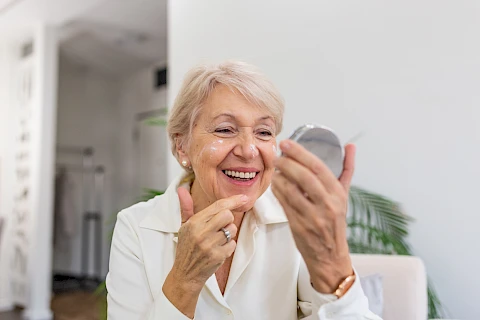
With Wisconsin's winters come dry, itchy skin, and that makes November the perfect time for National Healthy Skin Month. Skin health is essential for seniors because it greatly impacts their overall well-being and comfort. As a caregiver, keeping an eye on skin health can help prevent potential problems and promote a better quality of life.
Senior Skin Health: The Basics
As we age, our skin naturally changes. These may include thinning, dryness, and a decreased ability to heal quickly. Seniors may also experience increased fragility, making them more susceptible to bruising and tearing. Various factors can affect these changes, such as age, medications, sun damage, and environmental conditions. Understanding these variables is the first step in supporting healthy skin.
Gentle Skincare Routines
Choosing the right skincare products is essential. Opt for items that are fragrance-free, hypoallergenic, and specifically designed for sensitive skin. These qualities can help prevent irritation.
A gentle skincare routine tailored for seniors can make a big difference. Begin with regular cleansing using a mild, soap-free cleanser to remove dirt and oils. After cleansing, apply a hydrating moisturizer to replenish the skin's natural oils. Regularly moisturizing can help maintain the skin's natural barrier and prevent dryness.
Follow this routine once in the morning and once before bed for optimal results. Applying sunscreen is a must when going outdoors during the day, no matter the weather.
Proper Hydration
Hydration plays a vital role in maintaining healthy skin. Encourage seniors to drink more water throughout the day. You can make this easier by offering water in small, frequent amounts.
In addition to drinking water, consider foods that contribute to hydration. Fresh fruits like watermelon, cucumbers, and oranges are excellent choices. Soups and low-sodium broths can also add to daily fluid intake. Staying hydrated helps maintain skin elasticity and can reduce the risk of excessive dryness.
Monitoring for Skin Problems
Caregivers should keep an eye out for common skin issues that seniors may face, such as dryness, bruising, and infections. Regular skin checks can help identify potential problems early.
Be alert for signs like unusual rashes, redness, sores, or changes in skin texture. If you notice these symptoms, it's important to address them promptly to prevent them from worsening. Being proactive in skin health monitoring can lead to earlier interventions and better outcomes, especially since skin cancer is common among seniors.
Seeking Medical Advice
Know when to seek medical advice beyond the recommended annual skin screenings. If a skin issue is persistent or worsening, consult a healthcare professional. Changes in moles or the appearance of new growths warrant immediate attention. Caregivers should play an active role in facilitating medical appointments, ensuring that seniors get the professional guidance they need. Healthcare professionals can provide valuable advice and treatment options for effectively managing skin health concerns.
Stay Skin Healthy With Senior Helpers
Supporting senior skin health involves understanding common changes, implementing gentle skincare routines, promoting hydration, and staying vigilant for potential problems. Prioritizing skin health is a significant part of caregiving that can enhance comfort and well-being.
Senior Helpers of Madison, Wisconsin, is committed to providing personalized care and support for seniors in the Madison, Stoughton, Oregon, Monona, and Sun Prairie areas. If you'd like to learn about how we empower seniors to live enriched, independent lives in their own homes, contact us today.